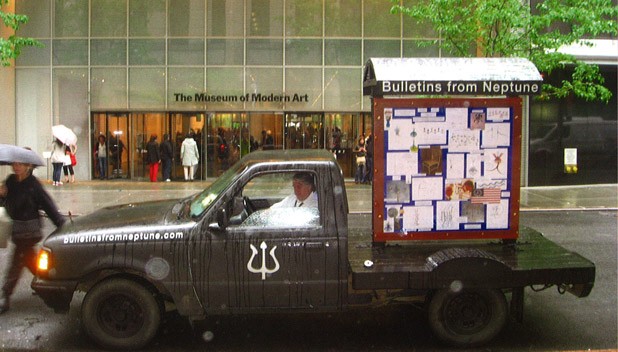
- Tom Mulholland in New York City last May.
In recent months, many drivers in central Vermont have spotted a small, black pickup that looks as though it crashed into a bus-station kiosk and just kept on driving. The hand-painted 1994 Ford Ranger sports a white trident on each door and a pair of plastic-covered display panels mounted upright in its flatbed under a sign reading, “Bulletins from Neptune.”
WTF? A new kiosk delivery service? A low-tech advertising campaign for Trident Seafoods fish sticks? A religious zealot announcing the ancient Roman holiday of Neptunalia, which falls on July 23?
No, no and hell no. In fact, the roving bulletin boards are the handiwork of Tom Mulholland, 63, a Middlesex master plumber by trade and lifelong artist, sculptor and poet by avocation. Seven Days caught up with Mulholland recently at Burlington’s City Market, where he had stopped for dinner — strictly vegetarian, he emphasizes, in a baritone that retains his native Long Island accent.
As artists go, Mulholland exemplifies the adage “Don’t judge a book by its cover.” Huskily built, with meaty, workingman’s hands, and wearing a faded ball cap and black T-shirt, he looks the part of the stereotypical, rosy-cheeked plumber who shows up at your door at 7 a.m. to snake out a clogged toilet. So when Mulholland talks about consciousness-expanding meditation, astrological charts and the history of collage in the 20th century, it seems as incongruous as a drill sergeant reciting Shakespearean sonnets.
Mulholland’s creative tendencies aren’t as uncharacteristic as they might at first appear. He moved to Vermont in 1966 to attend what was then Royalton College, now Vermont Law School. As a child of the ’60s, Mulholland admits he bought into the “tune in, turn on, drop out” philosophy. Two years later, however, married and with a first child on the way, he was “building [his] first hippie house and joining the working class.”
Two more marriages, a six-year stint in France and several self-built homes (or “nest sculptures”) later, Mulholland was back in the states, on his own and spending his free time away from leaky faucets to pursue more creative endeavors. Mulholland’s truck, or “vehicle as vehicle,” as he calls it, is his latest effort to share with the world what he claims is an entirely new form of expression: bulletin-board art.
“Bulletin-board art is just like the bulletin board in the supermarket — babysitting service, tires, apartments for rent,” he says. Unlike collages, he explains, “Everything that’s on there is independent of what else is on the board.” No form of art is subservient to any other, “so poetry and art coexist as equals.”
To wit, Mulholland’s truck displays a hodgepodge of seemingly unrelated works: sketches, paintings, aphorisms, philosophical ruminations, poetry and photographs of his other creations. Among the snapshots are one of a “plumber’s marriage bed” built from welded copper pipes; an 80-foot-long pedestrian bridge that spans a creek in Worcester, Vt.; and an unusual painting of Old Glory as an astrological chart for a nation “born” on July 4, 1776.
The last, titled “Starry Eyed America,” was originally used in a performance piece Mulholland says he and two friends did on Flag Day in 1979 outside the Betsy Ross House in Philadelphia. The trio reenacted the fife-and-drum scene from the famous “Spirit of ’76” painting by Archibald MacNeal Willard. On that same day, Mulholland recalls explaining his own painting to Buckminster Fuller, who happened to be giving a keynote address on the origins of the American flag. “He was also a Cancerian,” Mulholland notes.
So why are Mulholland’s “bulletins” from Neptune? Simple, he says. “Neptune, astrologically speaking, governs the arts.”
The reaction to his mobile-art installation — yes, it’s street legal, he says, and surprisingly aerodynamic, despite its size — has been mixed. Mulholland expresses some disappointment at how few locals have asked him about the truck, versus tourists and other travelers, who seem far more curious.
“It’s inviting,” he says of his pickup. “Many times I’ve come out to my truck, and people are sitting on it.”
Mulholland’s rolling canvas won’t be in Vermont for much longer. On August 10, he plans to drive it to Port Newark in New Jersey, where it will be loaded onto a freighter bound for Antwerp, Belgium, then driven around Europe for five weeks. Until the truck’s arrival there on September 1, Mulholland will be at a meditation retreat near Bangalore, India, where, he says, “I can invest in my consciousness.”
Mulholland seems unfazed by the relatively scant attention his artwork has received thus far in Vermont; he says he expects a better reception in the Old World. “What’s that old saying?” he says. “‘A prophet can do no good in his own land.’”
He also acknowledges an existential inevitability: His body won’t be able to handle the physical demands of plumbing work for much longer.
“At age 63, I know I’m in Act III of my life,” he muses. “One doesn’t know when the final curtain call is going to come. And there is no encore.”
Outraged, or merely curious, about something? Send your burning question to [email protected].









Comments
Comments are closed.
From 2014-2020, Seven Days allowed readers to comment on all stories posted on our website. While we've appreciated the suggestions and insights, right now Seven Days is prioritizing our core mission — producing high-quality, responsible local journalism — over moderating online debates between readers.
To criticize, correct or praise our reporting, please send us a letter to the editor or send us a tip. We’ll check it out and report the results.
Online comments may return when we have better tech tools for managing them. Thanks for reading.